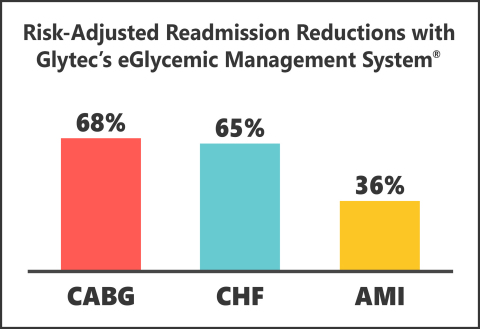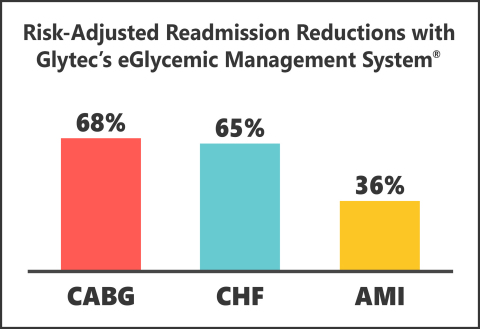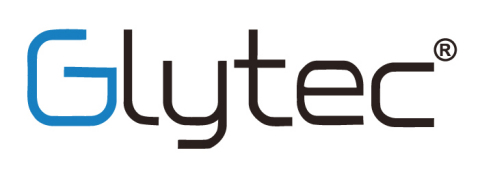WALTHAM, Mass.--(BUSINESS WIRE)--Two new studies presented at last week’s Diabetes Technology Meeting further validate the ability of Glytec’s eGlycemic Management System® (eGMS®) to achieve dramatic readmission reductions for patient populations at the center of new at-risk and value-based reimbursement models, including the CMS Hospital Readmission Reduction Program (HRRP) and impending bundled payment for coronary artery bypass graft surgery (CABG).
Both studies, led by Tamera Parsons, CPHQ and April Mumpower, BSH of Mountain States Health Alliance, compare outcomes of cardiovascular patients receiving care with eGMS® to outcomes of cardiovascular patients receiving standard care, i.e., without eGMS®. The data shows cardiovascular patients receiving care with eGMS® return far less frequently, with reductions in risk-adjusted 30-day readmissions as high as 68%.
|
Outcomes with Glytec’s eGMS® |
||||||
| Readmission Reduction | Patient Population | |||||
| 68% | Coronary Artery Bypass Graft Surgery (CABG) | |||||
| 65% | Congestive Heart Failure (CHF) | |||||
| 36% | Acute Myocardial Infarction (AMI) | |||||
The basis for the two studies was formed in response to a system-wide glycemic initiative launched by the Johnson City, Tennessee-based not-for-profit health care organization, which operates 13 hospitals. The researchers recognized that patients admitted and discharged with elevated blood glucose, or hyperglycemia, have higher incidence of complications, longer lengths of stays and increased rates of readmission. According to Parsons, Vice President of Quality, “Our cardiovascular caregivers anticipated that if we identified hyperglycemia earlier in the admission, administered tight glycemic control throughout the stay, and improved transitions from intravenous to subcutaneous insulin regimens, we’d see better outcomes. These studies validate our hypothesis that using Glytec’s automated surveillance, insulin dosing and analytics to achieve these goals has a sizable impact on the outcomes we’re able to achieve.”
Like most health systems, Mountain States Health Alliance has been challenged to initiate timely insulin therapy for patients with undocumented, undiagnosed or stress-induced diabetes. One of the key benefits of Glytec’s eGMS® is the GlucoSurveillance® module that alerts care teams to patients with blood glucose outside a designated range. The module interfaces directly with laboratory information systems to perform continuous enterprise-wide surveillance. “If the need for insulin therapy is delayed or goes unnoticed, and glucose is not properly controlled, patients have an increased risk of readmission,” says Parsons. “Our studies underscore that by starting these patients on an appropriate intravenous or subcutaneous insulin regimen right away, we can get them to a prescribed target very quickly, and we can keep them there with very little standard deviation. Glytec’s eGMS® gave us the systematic and standardized means we needed to accomplish this, with high reliability.”
In addition to dramatic reductions in risk-adjusted readmissions, both studies highlight significant decreases in hypoglycemia and average final blood glucose with eGMS® versus standard care. In the study entitled, Does Glycemic Control Using eGMS® Reduce Readmission Rates for Hospitalized Patients Undergoing CABG?, the percent of hypoglycemic events <40 mg/dL was 0.009% with eGMS® vs 0.36% with standard care (97.50% reduction), the percent of hypoglycemic events <70 mg/dL was 0.48% with eGMS® vs 2.61% with standard care (81.61% reduction), and the average final blood glucose was 127.9 mg/dL with eGMS® vs 185.68 mg/dL with standard care (31.12% lower).
Similarly, in the study entitled, Relationship Between Glycemic Control Using eGMS® and Readmission Rates in Cardiovascular Patients Hospitalized with AMI, CHF or Undergoing CABG During the Implementation of a System Wide Glycemic Initiative, the percent of hypoglycemia events <40 mg/dL was 0.01% with eGMS® vs 0.39% with standard care (97.44% reduction), the percent of hypoglycemic events <70 mg/dL was 0.50% with eGMS® vs 2.78% with standard care (82.01% reduction), and the average final blood glucose was 122.1 mg/dL with eGMS® vs 184.1 mg/dL with standard care (33.68% lower).
“The data indicates a direct correlation between risk-adjusted readmission rates and tight glycemic control for our cardiovascular patients,” explains Mumpower, Senior Quality Data Analyst. “The patients on Glytec’s eGMS® had lower rates of hyperglycemia and hypoglycemia, lower blood sugars during their admission, and even more importantly, lower blood sugars at discharge, all of which contributed to markedly fewer readmissions.”
About Glytec
Founded in 2006, Glytec is a leading innovator in the care of patients with diabetes, pioneering the way hospitals and health systems use technology to ensure optimal glucose control and reduce the frequency, risks and costs of hyperglycemia and hypoglycemia. The company’s unique, comprehensive eGlycemic Management System®, or eGMS® centers on the only FDA-cleared insulin dosing solution able to support intravenous and subcutaneous therapy for adult and pediatric populations across the entire care continuum. The eGMS® offers personalized clinical decision support that seamlessly integrates with EMR systems and connected devices for streamlined use in all inpatient and outpatient settings, with the distinctive ability to support at-home, prescriber-directed care managed through telehealth, population health and other value-based programs. The eGMS® employs a cloud-hosted software-as-a-service (SaaS) model, allowing for rapid implementation and anytime, anywhere access. Efficacy of the eGMS®, including its ability to substantively improve clinical and financial outcomes, has been validated by more than 55 research studies. Results have included dramatic reductions in lengths of stay, readmissions and A1c levels. Glytec currently holds five U.S. patents and has more than 50 U.S. and international patents pending. The company has offices in Waltham, Massachusetts and Greenville, South Carolina. For more information, visit www.glytecsystems.com.
About Mountain States Health Alliance
Since 1998, Mountain States Health Alliance has been bringing the nation’s best health care close to home to serve the residents of Northeast Tennessee, Southwest Virginia, Southeastern Kentucky and Western North Carolina. This not-for-profit health care organization based in Johnson City, Tenn., operates a family of 13 hospitals serving a 29-county region. Mountain States offers a large tertiary hospital with a level 1 trauma center, a dedicated children’s hospital, several community hospitals, two critical access hospitals, a behavioral health hospital, two long-term care facilities, home care and hospice services, retail pharmacies, outpatient services, and a comprehensive medical management corporation. The team members, physicians and volunteers who make up Mountain States Health Alliance are committed to caring for you and earning your trust. For more information, visit www.mountainstateshealth.com.




